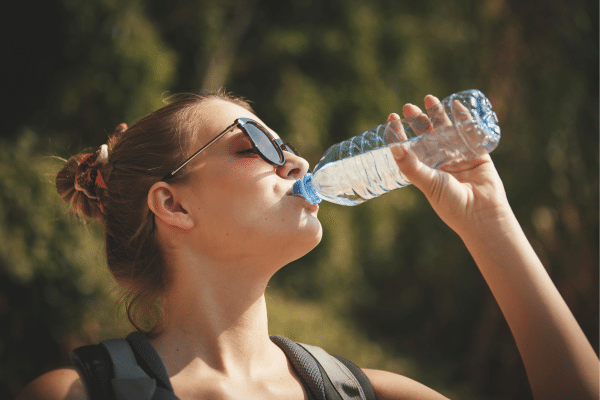Water weight remains a topic of curiosity for many, primarily because it can be the unseen culprit behind those unexpected fluctuations on the scale. Often mistaken for persistent fat, water weight is actually the body’s temporary storage of excess fluid. It’s crucial to understand this phenomenon, especially for those navigating their health and fitness journey. By shedding light on what water weight truly is and how it can be managed, individuals can make more informed decisions about their wellbeing.
Contents
What Is Water Weight?

Water weight, or fluid retention, refers to the additional water stored throughout the body. This can manifest in swollen fingers, puffiness in the face, and even a bloated feeling in the legs and toes. Several factors can lead to this retention, ranging from dietary habits and hormonal fluctuations to specific medications. It’s worth noting that this isn’t permanent fat gain or loss, but rather a temporary shift in body composition that can change daily.
While it might be easy to dismiss water weight as a minor concern, its presence can significantly impact one’s feeling of health and comfort. For instance, excessive water retention can cause stiffness, discomfort, and a lack of confidence, especially when clothes feel tighter than usual. By recognizing and addressing the causes, it becomes easier to manage this aspect of health and maintain a consistent bodily state.
Best Ways To Get Rid Of Water Weight
Several strategies can effectively tackle water weight. Each method targets the root causes of fluid retention, ensuring long-term relief and a more balanced bodily state.
Dietary Changes For Reduction

Diet plays a pivotal role in determining how much water the body retains. Consuming excessive amounts of sodium, for example, can signal the body to hold onto more water. This is why foods high in salt, such as processed snacks and certain restaurant dishes, can lead to noticeable bloating shortly after consumption. Balancing the diet by reducing sodium intake and incorporating foods like fresh vegetables, fruits, and lean proteins can mitigate these effects.
Another dietary consideration revolves around the consumption of certain carbohydrates. Foods high in refined carbs can lead to rapid spikes in blood sugar and insulin levels. When insulin levels are elevated, the kidneys tend to retain sodium, which in turn results in water retention. By moderating the intake of refined carbs and focusing on whole, unprocessed foods, one can effectively manage and reduce the chances of accumulating water weight.
Exercise and Physical Activity

Regular physical activity serves as one of the most effective ways to combat water weight. Engaging in consistent exercise promotes circulation, helping distribute and expel any trapped fluids within the body. Cardiovascular activities, such as running, cycling, and swimming, can be particularly beneficial, prompting the body to sweat and thereby expel stored fluids.
Aside from direct fluid expulsion through sweat, exercise also offers indirect benefits. Regular activity supports hormonal balance and enhances metabolic functions, which can indirectly aid in managing and preventing excessive water retention. Thus, maintaining an active lifestyle can not only aid in keeping water weight at bay but also promotes overall well-being and vitality.
Herbs and Natural Diuretics

Nature offers an array of remedies that can assist in managing water weight. Certain herbs and foods act as natural diuretics, meaning they encourage the body to expel more urine and, consequently, excess fluids. Dandelion, for instance, has been used for centuries in various cultures for its diuretic properties. Incorporating it into meals or as a tea can aid in managing fluid balance.
However, while natural diuretics can be effective, it’s essential to use them mindfully. Overconsumption or reliance on these remedies can tip the balance and lead to dehydration, which brings its own set of complications. Striking a balance by using natural diuretics judiciously while monitoring hydration levels ensures both safety and efficacy in addressing water weight.
Manage Stress Levels

Chronic stress has more implications than just mental exhaustion; it can also manifest physically, leading to hormonal imbalances. One such hormone affected by stress is cortisol. When cortisol levels rise, the body tends to retain more sodium, leading to increased water retention. It becomes imperative to identify and manage sources of stress to ensure not just mental but also physical well-being.
Various stress-reduction techniques can be integrated into daily routines. Meditation, deep-breathing exercises, and engaging in hobbies can all play a role in lowering cortisol levels. Consistency in practicing these methods can help achieve a more balanced and harmonious state, reducing the chances of unwarranted water retention.
Stay Hydrated And Mind Your Electrolytes

Hydration isn’t solely about the volume of water consumed, but also its quality and the balance of minerals that accompany it. Electrolytes play a pivotal role in this balance. They are charged particles responsible for ensuring that cells function correctly. When electrolyte levels are off-kilter, it can result in either excessive water retention or rapid water loss, both of which can lead to complications.
Maintaining an optimal balance of key electrolytes, such as potassium, magnesium, and sodium, is crucial. Whether it’s through supplementation or other methods, ensuring that these minerals are in balance can aid in regulating water levels within the body. Regularly monitoring hydration status and being mindful of signs such as the color of urine, which can indicate hydration levels, can be beneficial in managing water weight effectively.
The Bottom Line
Water weight, while often overlooked, plays a significant role in one’s overall feeling of health and comfort. Understanding its causes and implementing strategies to manage it can lead to a more consistent and comfortable bodily state. Adopting a holistic approach, from diet and exercise to stress management and hydration, can significantly impact how one navigates this aspect of health. Balancing these elements not only addresses water weight but also fortifies the foundation for a healthier lifestyle.


